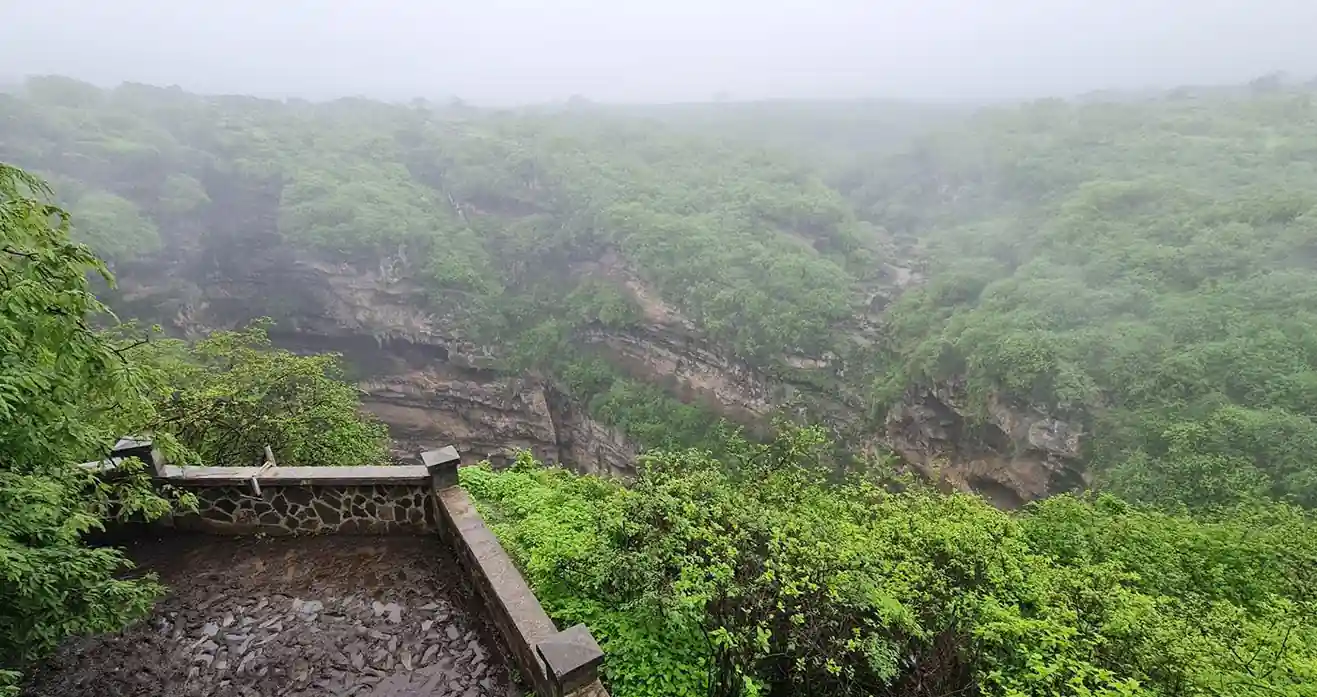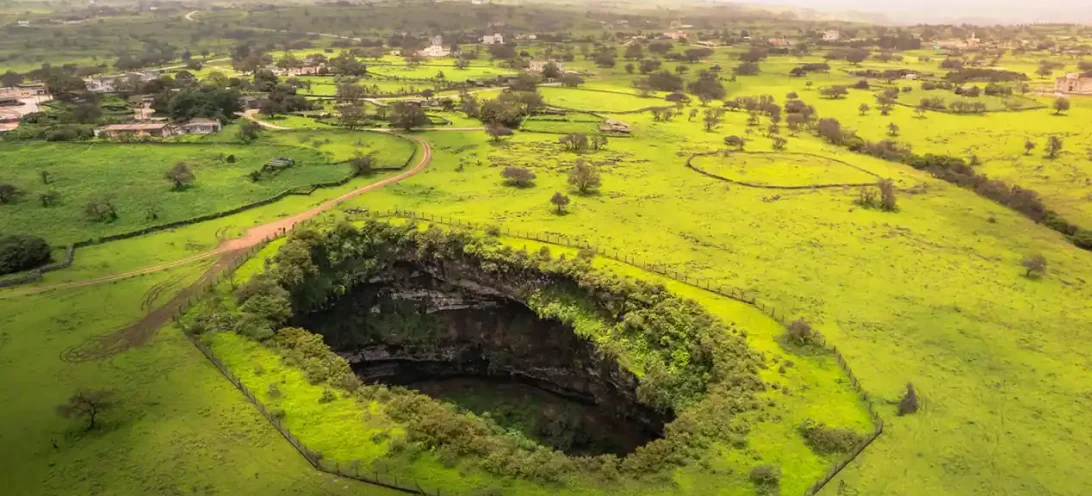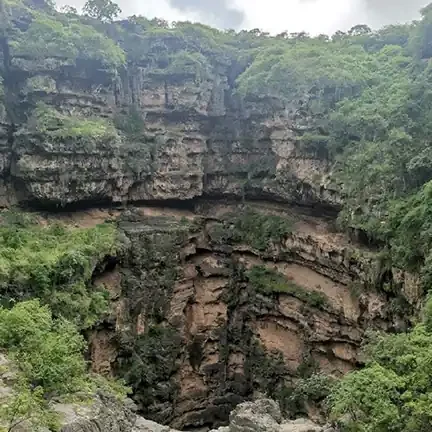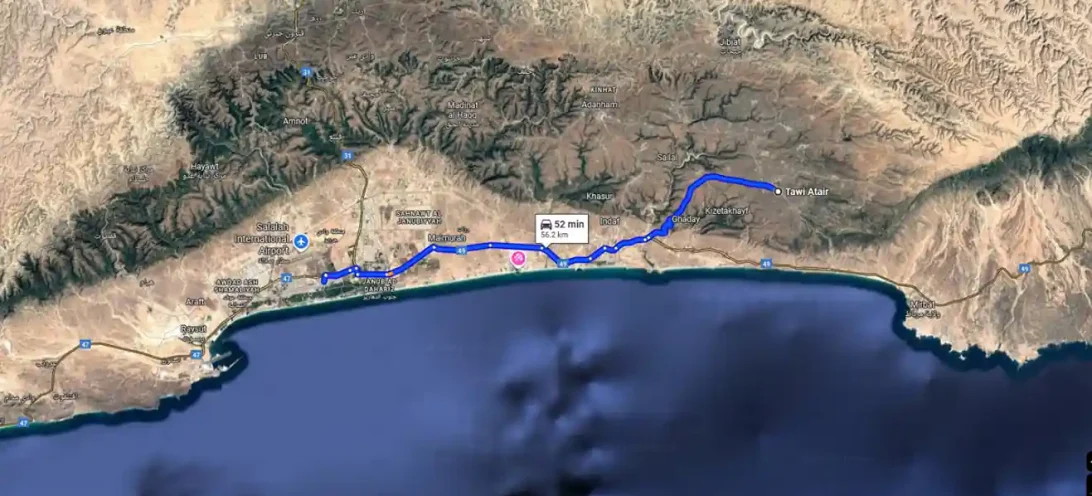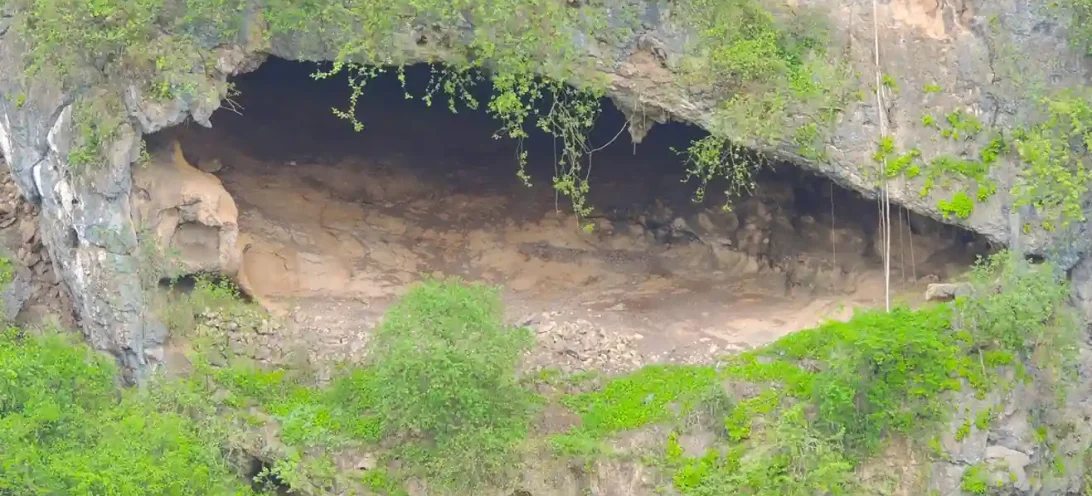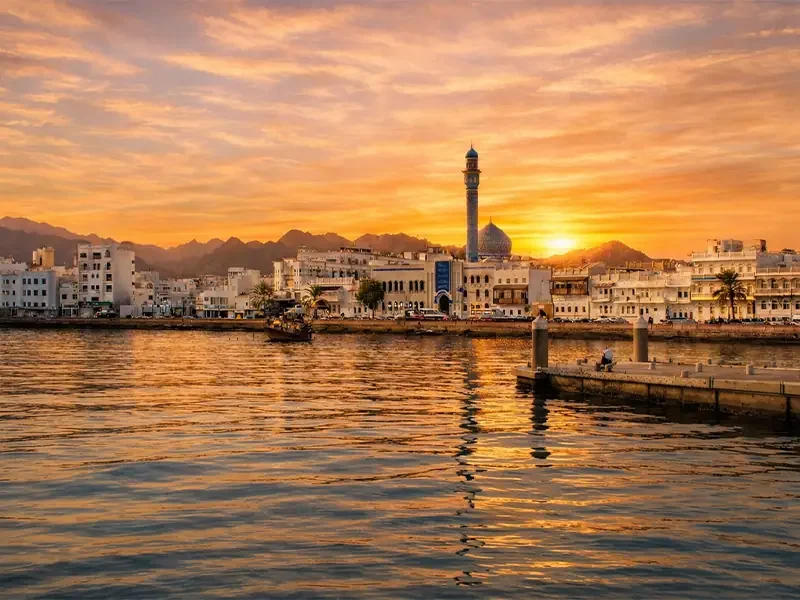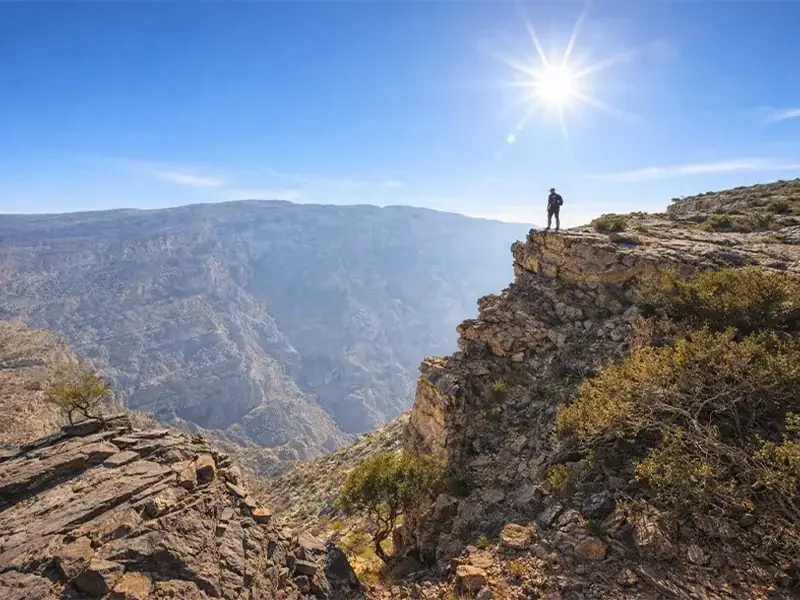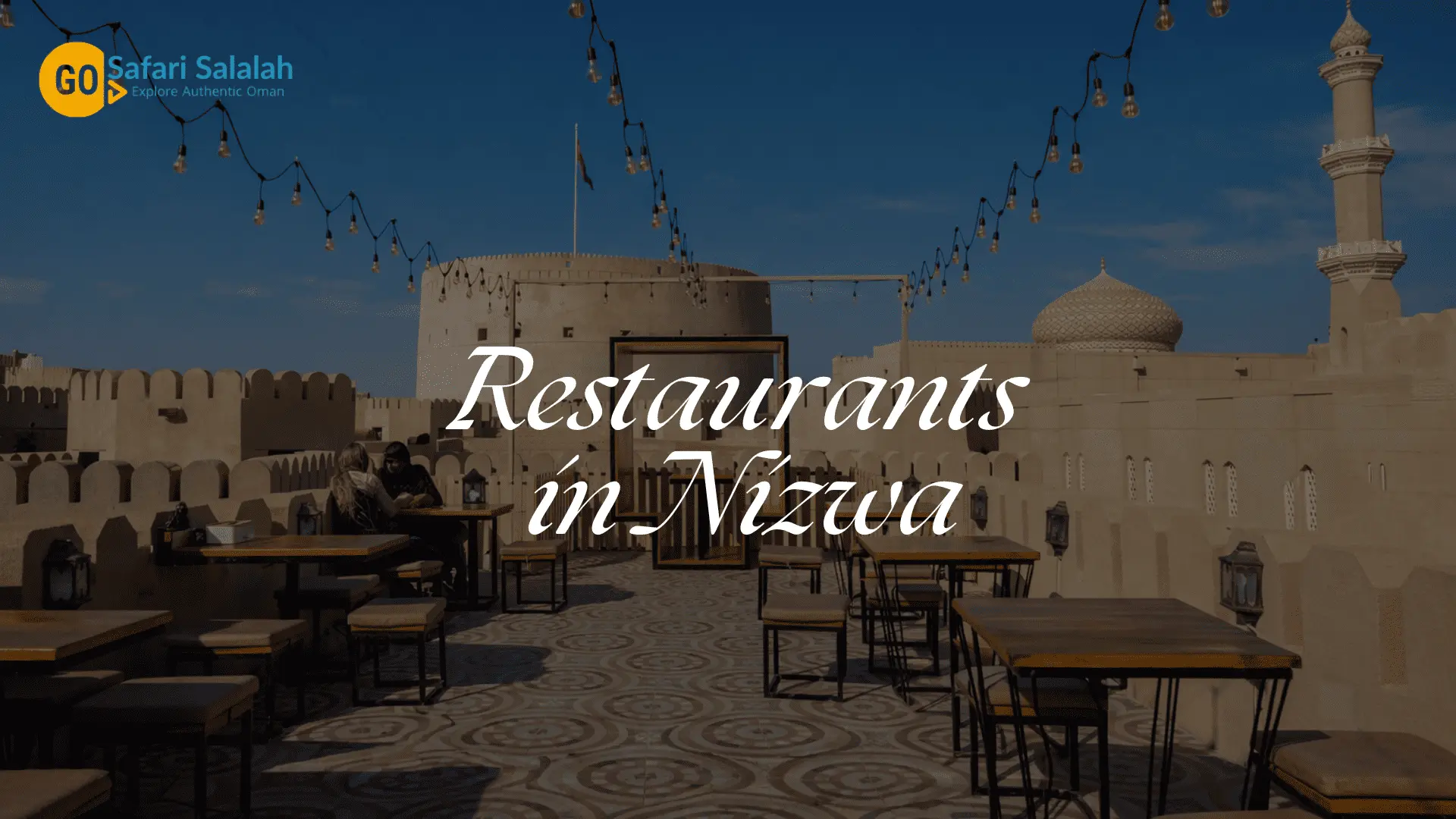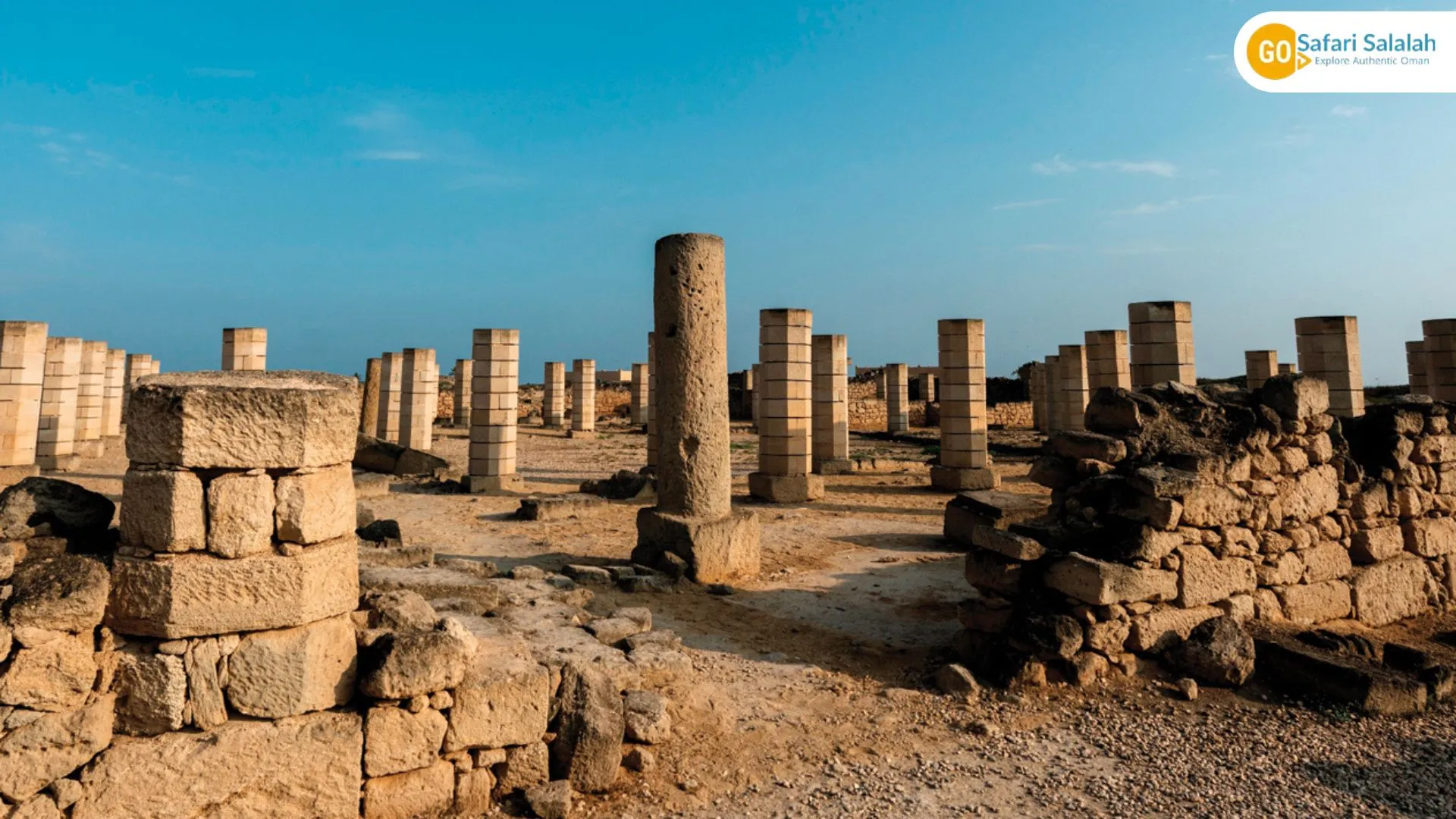Why Tawi Attair is a Must-Visit Destination
High in the Samhan Mountains of Dhofar, a natural masterpiece lies hidden among limestone cliffs: the Tawi Attair Sinkhole. Known locally as the “Well of Birds”, this massive depression is among the largest natural sinkholes in the world, stretching 150 meters in diameter and plunging to a depth of 211 meters.
Unlike other geological craters that appear barren, Tawi Attair combines raw geology, thriving biodiversity, cultural legends, and breathtaking adventure. For travelers seeking an extraordinary destination beyond typical beaches and resorts, this sinkhole offers an unmatched journey through science, nature, and myth.
What is the Tawi Attair Sinkhole
Located about 35 km northeast of Salalah city in Oman’s Dhofar Governorate, Tawi Attair is a karst depression formed by the dissolution of limestone over millions of years. Rainwater and underground streams gradually eroded the soft limestone, creating vast subterranean caverns that eventually collapsed, leaving behind this spectacular void.
-
Diameter: ~150 meters
-
Depth: 211 meters
-
Elevation: 1,400 meters above sea level
Scientists estimate that the sinkhole is millions of years old, making it a living record of Oman’s geological history.
Geology of Tawi Attair: Earth’s Story Written in Rock
High in the Samhan Mountains of Dhofar, a natural masterpiece lies hidden among limestone cliffs: the Tawi Attair Sinkhole. Known locally as the “Well of Birds”, this massive depression is among the largest natural sinkholes in the world, stretching 150 meters in diameter and plunging to a depth of 211 meters.
Unlike other geological craters that appear barren, Tawi Attair combines raw geology, thriving biodiversity, cultural legends, and breathtaking adventure. For travelers seeking an extraordinary destination beyond typical beaches and resorts, this sinkhole offers an unmatched journey through science, nature, and myth.
1. Karst Formation
The sinkhole exemplifies karst topography, a landscape shaped when water dissolves soluble rock such as limestone, dolomite, or gypsum. Over time, rainwater rich in carbon dioxide carved underground passages until the cavern roof collapsed, forming the vast depression we see today.
2. Fossil Evidence
The walls of the sinkhole contain fossilized seashells and marine organisms, evidence that this region was once covered by an ancient ocean. These fossils date back over 50 million years, linking Dhofar’s mountains to a submerged world.
3. Subterranean Passages
Explorers and local guides report narrow caves and openings around the sinkhole edges, suggesting that Tawi Attair may connect to underground tunnels still waiting to be mapped. This unexplored network continues to fascinate geologists and speleologists worldwide.
Customize your Trip With Go Safari Salalah
Are our Salalah City Tour places not fulfilling enough? Contact us and tailor a city tour to your aspirations and desires.
Biodiversity: The Living “Well of Birds”
Unlike barren craters, Tawi Attair nurtures a unique ecosystem due to its microclimate.
1. Birdlife
The sinkhole is famously known as the Well of Birds because hundreds of birds roost and nest within its walls. Commonly spotted species include:
-
Arabian vultures soaring above the cliffs
-
Indian rollers adding bursts of color
-
Rock doves nesting in limestone crevices
-
Swifts circling the sinkhole at dawn and dusk
The sight of birds filling the sky during sunrise and sunset creates a mesmerizing natural performance.
2. Flora
Thanks to shade and humidity, rare plants and medicinal herbs grow inside the sinkhole, contrasting with the dry mountains around it. Ferns, mosses, and flowering shrubs create an oasis-like environment rarely seen at such elevation.
3. Fauna
Local accounts describe mountain foxes, hyraxes, and bats inhabiting the caves and ledges of the sinkhole, forming a delicate food chain that thrives in this isolated sanctuary.
Legends and Cultural Myths
For locals, Tawi Attair is more than geology—it is a site woven with myth and folklore.
Gateway to the Underworld: Some villagers once believed the sinkhole was a door to another realm, explaining its unfathomable depth.
Voices of Spirits: The wind whistling through caves produces eerie echoes, interpreted as the cries of ancient spirits.
Origin of the Name: “Tawi Attair” directly translates to “Well of Birds”, a reflection of the site’s avian abundance and its cultural symbolism.
These legends transform the sinkhole from a natural landmark into a cultural treasure, blending science and spirituality.
Visiting Tawi Attair: What to Expect
Travelers visiting Tawi Attair can enjoy a variety of experiences:
1. The Viewing Platform
At the rim, visitors enjoy panoramic views of both the sinkhole and the rugged Dhofar mountains. It’s the best spot for photography, especially during sunrise and sunset.
2. Trekking Inside
Adventurous hikers can attempt partial descents along steep trails. While reaching the very bottom requires professional equipment, descending partway down reveals lush vegetation and unique perspectives.
3. Silence and Solitude
Inside the sinkhole, sound diminishes dramatically. The silence, broken only by bird calls, creates a spiritual sense of isolation—perfect for meditation or photography.
How to Get There
Location: 35 km northeast of Salalah, near Tawi Attair village.
Transport: A 4×4 vehicle is strongly recommended due to mountain roads.
Guides: Hiring a local guide is advised for cultural insights and safe trekking.
Travel Tips for Visitors
Best Time to Visit: The Khareef season (July–September) when monsoon rains turn Dhofar into lush greenery.
What to Bring: Hiking boots, water, camera, light snacks, and binoculars for birdwatching.
Safety Precautions: Avoid visiting alone; do not attempt deep descents without professional gear.
Local Etiquette: Respect cultural values—many locals view the site as sacred, not just a tourist attraction.
Why Tawi Attair is Worth Visiting
🌍 Unique Geological Wonder: Among the largest sinkholes in the world.
🦜 Biodiversity Hotspot: A paradise for birdwatchers and nature lovers.
🕌 Cultural Heritage: A blend of science, myth, and local identity.
🥾 Adventure Destination: Perfect for hiking, trekking, and photography.
When compared to other global sinkholes—such as the Al-Wahbah Crater in Saudi Arabia or the Great Blue Hole in Belize—Tawi Attair stands out for its elevation, biodiversity, and cultural legends.
Conclusion
The Tawi Attair Sinkhole is not merely a geological formation—it is a living museum of Earth’s history, a sanctuary for wildlife, and a monument of Omani heritage.
Whether you are a geologist, a photographer, a birder, an adventurer, or simply a curious traveler, visiting the Well of Birds promises an unforgettable experience.
📌 Don’t miss it: Add Tawi Attair Sinkhole to your Salalah itinerary and uncover one of Oman’s most extraordinary natural wonders.

